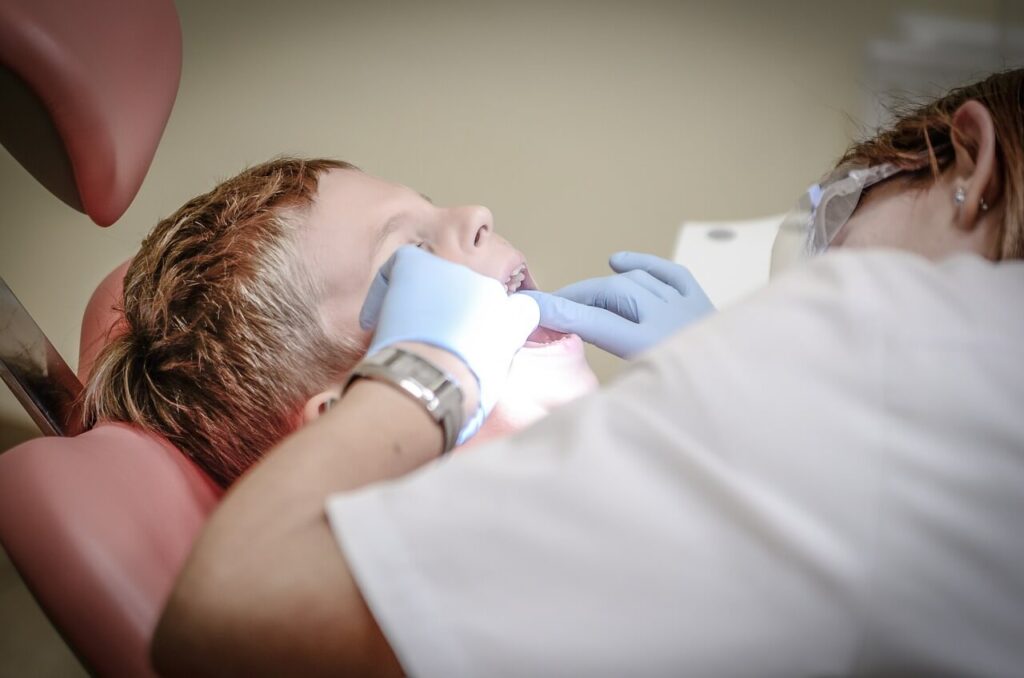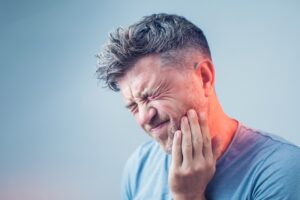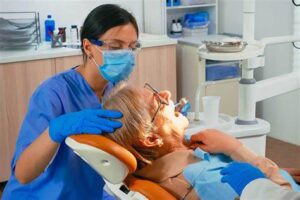
February 23, 2025
Tooth pain or a broken tooth can show up fast—and it’s never at a good time. One minute everything’s fine, and the next, you’re in serious pain, bleeding, or trying to figure out what to do after a tooth gets knocked out.
Emergency dental care is needed when something happens to your teeth, gums, veneers, or mouth that can’t wait. This includes things like a cracked tooth, an infection, or pain that keeps you up at night.
What you do in the first few minutes really matters. Staying calm, knowing the right steps, and getting help quickly can prevent worse problems—like losing a tooth or letting an infection spread.
This guide breaks it all down in simple steps. No stress, no guessing. If something ever goes wrong with your teeth, you’ll know exactly what to do—and how to help someone else if they’re in pain too.
What Is Considered a Dental Emergency?
Not every tooth problem needs help right away—but some things just can’t wait. Emergency dental care is for serious issues that need fast attention to stop pain, bleeding, or long-term damage.
Here are signs it’s a real dental emergency:
- Severe pain that won’t go away
- Bleeding that doesn’t stop after a few minutes
- A tooth that’s knocked out or broken
- Swelling in your face or jaw, especially with pain or fever
- Signs of infection like pus, a bad taste in your mouth, or trouble opening your mouth
- A lost filling or crown that’s causing pain or making it hard to eat
If you’re dealing with any of these, don’t wait—get help as soon as you can.
Some things, though, aren’t as urgent. A small chip, a sore spot on your gums, or a lost filling that doesn’t hurt can usually wait a day or two. Still, it’s always smart to call your dentist and ask.
Knowing the difference helps you act fast when it really matters—and keeps small issues from turning into big ones.
Immediate Steps to Take in a Dental Emergency
When something suddenly goes wrong with your teeth or mouth, it’s easy to panic—but staying calm helps more than you’d think. The first thing to do is take a breath and look at what’s happening. If there’s bleeding, gently rinse your mouth with warm water. This helps clean the area so you can see what you’re dealing with.
If bleeding doesn’t stop, press a clean cloth or some gauze against the spot. For swelling or pain, placing a cold pack on the outside of your face can help bring it down. Avoid putting ice directly in your mouth—it can do more harm than good.
If the pain is strong, you can take over-the-counter medicine like ibuprofen. Follow the directions on the label, and don’t use more than the recommended amount. Never put aspirin directly on your gums—it can cause burns.
Most importantly, don’t wait too long to call for emergency dental care. Trying to fix things on your own or ignoring the pain can make the problem worse. Quick action at home is helpful, but a dentist still needs to take a look as soon as possible.
What To Do for Specific Dental Emergencies
Different dental problems need different care—here’s what to do in some of the most common emergency dental situations.
Knocked-Out Tooth
If a tooth gets knocked out, acting fast can give you the best shot at saving it. Pick up the tooth by the top part (called the crown). Don’t touch the root—the part that was under the gum. If there’s dirt on it, rinse it gently with water, but don’t scrub or use soap.
If you can, try to place the tooth back into its socket, facing the right way. Don’t force it. If that’s not possible, keep the tooth in a small container of milk or a saline solution. Water isn’t the best option—it can damage the root cells.
The sooner you get to a dentist, the better. Emergency dental care is most effective if you’re seen within 30 to 60 minutes. Waiting longer can lower the chances of saving the tooth. Bring the tooth with you and call the dental office right away to let them know you’re coming.
Cracked or Broken Tooth
A cracked or broken tooth can hurt and lead to more problems if ignored. First, gently rinse your mouth with warm water to clean out any blood or small pieces of tooth. If you find broken parts, save them in a clean container.
If the area is bleeding, press gauze or a soft cloth to help stop it. A cold pack on the cheek can reduce swelling and ease some of the pain. Try not to bite down or chew anything hard until a dentist checks the damage. Emergency dental care will help stop the pain and prevent further damage to the tooth.
Severe Toothache
Toothaches that don’t go away on their own can be a sign of something serious. Start by rinsing your mouth with warm salt water—it helps clean the area and can reduce pain. Sometimes food gets stuck between teeth, so use floss gently to check.
Never place aspirin directly on your gums—it can cause a burn. If the pain is strong or gets worse, don’t wait. Make an appointment for emergency dental care right away. Toothaches could mean there’s an infection, a cracked tooth, or a nerve issue. The longer you wait, the harder it can be to treat.
Dental Abscess or Swelling
An abscess is a pocket of infection, and it should never be ignored. Common signs include swelling in your face or jaw, pus, a bad taste in your mouth, or a fever. These can mean the infection is spreading, which is dangerous.
You can rinse gently with warm salt water to help keep the area clean, but do not try to pop or press on the swelling yourself. This can make things worse. You need emergency dental care as soon as possible. An untreated abscess can lead to serious health problems, so call your dentist or go to urgent care right away.
Lost Filling or Crown
If a filling or crown falls out, save it if you can and keep it clean. You can buy dental cement at most drugstores to temporarily cover the area. If you don’t have that, a piece of sugar-free gum can help protect the tooth until your appointment.
Don’t chew on that side of your mouth and avoid anything sticky or crunchy. Leaving the tooth exposed for too long can cause more pain or even permanent damage. Emergency dental care can help fix it before things get worse, so don’t put it off longer than a day or two.
Object Stuck Between Teeth
If something’s stuck between your teeth, gently try flossing it out. Don’t use toothpicks, tweezers, or anything sharp—these can hurt your gums or teeth. If the object won’t come out easily, it’s time to call your dentist. Emergency dental care can remove it safely without causing more damage.
When to Go to the ER vs. a Dentist
Not all dental emergencies are the same, and knowing where to go can save time and protect your health. If you’ve had a serious accident, are bleeding heavily, or can’t stop the pain, it’s best to head straight to the emergency room. You should also go to the ER if you’re struggling to breathe or swallow due to swelling or infection—those are medical emergencies, not just dental ones.
For most other situations, like a broken tooth, lost crown, or toothache, an emergency dentist is the right choice. The key is not to wait too long. Delaying care can turn a small problem into a big one.
How to Find an Emergency Dentist Quickly
Start by searching “emergency dental care near me” online, or check your local dental association’s website. Many dentists offer 24/7 help or same-day visits. Look for someone with good reviews and real-time availability. When you call, be ready to share your symptoms, any allergies, and your insurance info if you have it. The sooner you get seen, the faster you’ll feel better—and avoid more pain or costly treatments later.
Preventing Future Dental Emergencies
The best way to avoid needing emergency dental care is by taking care of your teeth every day. Brush twice a day, floss once, and try not to skip your checkups. Dentists can spot small problems before they turn serious.
If you play sports, wear a mouthguard to protect your teeth from chips or getting knocked out. Try not to chew on hard foods like ice or candy—these can crack your teeth without warning. Even biting popcorn kernels can do damage.
Simple habits go a long way. Keeping your teeth strong now can help you avoid painful emergencies later.
Conclusion – Quick Action Can Save Your Smile
Dental emergencies are never fun, but knowing what to do helps you stay in control. Acting fast can save a tooth and prevent bigger problems. It’s smart to keep your dentist’s contact info somewhere easy to find. That way, if something happens, you’re not scrambling for help.
Stay Ready for Any Dental Emergency
Keep a small kit at home with the basics—gauze, gloves, pain relievers, and dental cement. It’s also helpful to write down the steps from this article and post them somewhere easy to find. When every second counts, a little prep can make emergency dental care faster and less stressful.
Visit Dentistry at Renton for trusted emergency dental care and resources.
New Patient Specials
New patients are invited to take advantage of one of our first-time visitor specials!
To claim the offer, screenshot or print the coupon and show it at your initial appointment.
$149 New Patient Special Plus $100 Off Your Second Visit*
**New patients only. A $369 value. Cannot be combined with other offers or insurance.
10% Off Same Day Dental Services*
**New patients only. Cannot be combined with other offers or insurance.
$100 Off When We Treat Two Family Members on the Same Day
**Cannot be combined with other offers or insurance.
New Patient Online Offer
Receive $100 off Future Dental Treatment
with a New Patient Exam
Call (253) 852-4746 today to schedule.
Ready to Book Now? Use our Online Scheduler
BOOK AN APPOINTMENT
Patients choose Dentistry @ Renton for our convenient scheduling, affordable pricing, outstanding service, and incredible results. Experience the difference today!



